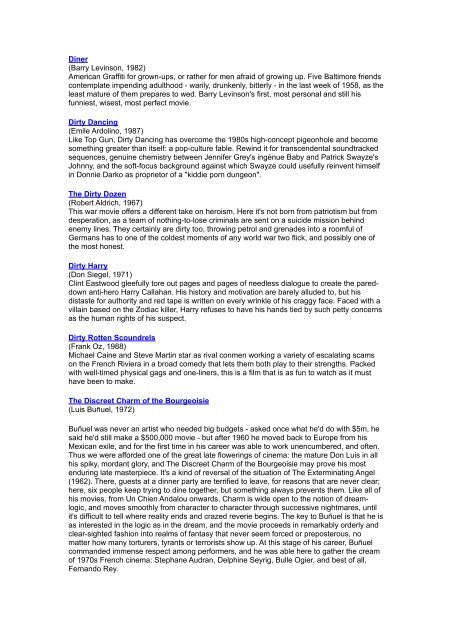Ace in the Hole - MatthewHunt
Ace in the Hole - MatthewHunt
Ace in the Hole - MatthewHunt
Create successful ePaper yourself
Turn your PDF publications into a flip-book with our unique Google optimized e-Paper software.
D<strong>in</strong>er<br />
(Barry Lev<strong>in</strong>son, 1982)<br />
American Graffiti for grown-ups, or ra<strong>the</strong>r for men afraid of grow<strong>in</strong>g up. Five Baltimore friends<br />
contemplate impend<strong>in</strong>g adulthood - warily, drunkenly, bitterly - <strong>in</strong> <strong>the</strong> last week of 1958, as <strong>the</strong><br />
least mature of <strong>the</strong>m prepares to wed. Barry Lev<strong>in</strong>son's first, most personal and still his<br />
funniest, wisest, most perfect movie.<br />
Dirty Danc<strong>in</strong>g<br />
(Emile Ardol<strong>in</strong>o, 1987)<br />
Like Top Gun, Dirty Danc<strong>in</strong>g has overcome <strong>the</strong> 1980s high-concept pigeonhole and become<br />
someth<strong>in</strong>g greater than itself: a pop-culture fable. Rew<strong>in</strong>d it for transcendental soundtracked<br />
sequences, genu<strong>in</strong>e chemistry between Jennifer Grey's <strong>in</strong>génue Baby and Patrick Swayze's<br />
Johnny, and <strong>the</strong> soft-focus background aga<strong>in</strong>st which Swayze could usefully re<strong>in</strong>vent himself<br />
<strong>in</strong> Donnie Darko as proprietor of a "kiddie porn dungeon".<br />
The Dirty Dozen<br />
(Robert Aldrich, 1967)<br />
This war movie offers a different take on heroism. Here it's not born from patriotism but from<br />
desperation, as a team of noth<strong>in</strong>g-to-lose crim<strong>in</strong>als are sent on a suicide mission beh<strong>in</strong>d<br />
enemy l<strong>in</strong>es. They certa<strong>in</strong>ly are dirty too, throw<strong>in</strong>g petrol and grenades <strong>in</strong>to a roomful of<br />
Germans has to one of <strong>the</strong> coldest moments of any world war two flick, and possibly one of<br />
<strong>the</strong> most honest.<br />
Dirty Harry<br />
(Don Siegel, 1971)<br />
Cl<strong>in</strong>t Eastwood gleefully tore out pages and pages of needless dialogue to create <strong>the</strong> pareddown<br />
anti-hero Harry Callahan. His history and motivation are barely alluded to, but his<br />
distaste for authority and red tape is written on every wr<strong>in</strong>kle of his craggy face. Faced with a<br />
villa<strong>in</strong> based on <strong>the</strong> Zodiac killer, Harry refuses to have his hands tied by such petty concerns<br />
as <strong>the</strong> human rights of his suspect.<br />
Dirty Rotten Scoundrels<br />
(Frank Oz, 1988)<br />
Michael Ca<strong>in</strong>e and Steve Mart<strong>in</strong> star as rival conmen work<strong>in</strong>g a variety of escalat<strong>in</strong>g scams<br />
on <strong>the</strong> French Riviera <strong>in</strong> a broad comedy that lets <strong>the</strong>m both play to <strong>the</strong>ir strengths. Packed<br />
with well-timed physical gags and one-l<strong>in</strong>ers, this is a film that is as fun to watch as it must<br />
have been to make.<br />
The Discreet Charm of <strong>the</strong> Bourgeoisie<br />
(Luis Buñuel, 1972)<br />
Buñuel was never an artist who needed big budgets - asked once what he'd do with $5m, he<br />
said he'd still make a $500,000 movie - but after 1960 he moved back to Europe from his<br />
Mexican exile, and for <strong>the</strong> first time <strong>in</strong> his career was able to work unencumbered, and often.<br />
Thus we were afforded one of <strong>the</strong> great late flower<strong>in</strong>gs of c<strong>in</strong>ema: <strong>the</strong> mature Don Luis <strong>in</strong> all<br />
his spiky, mordant glory, and The Discreet Charm of <strong>the</strong> Bourgeoisie may prove his most<br />
endur<strong>in</strong>g late masterpiece. It's a k<strong>in</strong>d of reversal of <strong>the</strong> situation of The Exterm<strong>in</strong>at<strong>in</strong>g Angel<br />
(1962). There, guests at a d<strong>in</strong>ner party are terrified to leave, for reasons that are never clear;<br />
here, six people keep try<strong>in</strong>g to d<strong>in</strong>e toge<strong>the</strong>r, but someth<strong>in</strong>g always prevents <strong>the</strong>m. Like all of<br />
his movies, from Un Chien Andalou onwards, Charm is wide open to <strong>the</strong> notion of dreamlogic,<br />
and moves smoothly from character to character through successive nightmares, until<br />
it's difficult to tell where reality ends and crazed reverie beg<strong>in</strong>s. The key to Buñuel is that he is<br />
as <strong>in</strong>terested <strong>in</strong> <strong>the</strong> logic as <strong>in</strong> <strong>the</strong> dream, and <strong>the</strong> movie proceeds <strong>in</strong> remarkably orderly and<br />
clear-sighted fashion <strong>in</strong>to realms of fantasy that never seem forced or preposterous, no<br />
matter how many torturers, tyrants or terrorists show up. At this stage of his career, Buñuel<br />
commanded immense respect among performers, and he was able here to ga<strong>the</strong>r <strong>the</strong> cream<br />
of 1970s French c<strong>in</strong>ema: Stephane Audran, Delph<strong>in</strong>e Seyrig, Bulle Ogier, and best of all,<br />
Fernando Rey.


